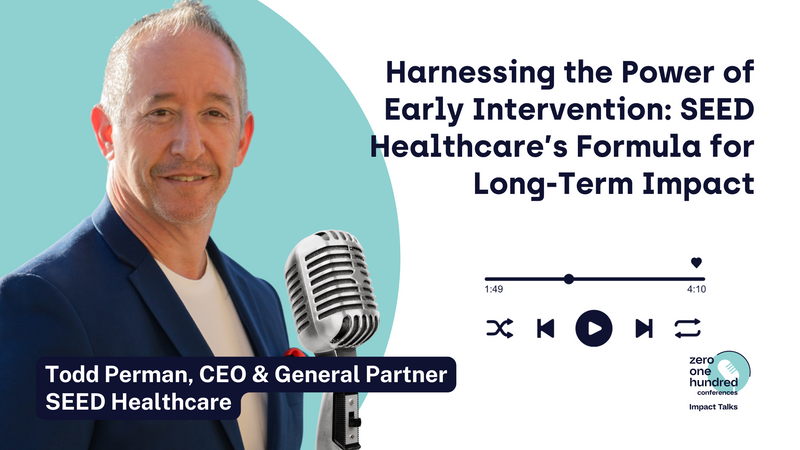Healthcare is one of the most vital—and capital-intensive—sectors on the planet. But what happens when you apply a focused, seed-stage venture capital lens to it? According to Todd Perman, Managing Partner at SEED Healthcare, you unlock the power of early intervention, long-term alignment, and transformative potential.
In this episode of 0100 Impact Talks, Todd breaks down the philosophy behind SEED Healthcare, a venture capital firm dedicated to backing entrepreneurs at the intersection of healthcare, science, and engineering.

Why Seed-Stage?
Unlike many healthcare VCs that wait for clinical or commercialization milestones, SEED embraces risk earlier in the lifecycle. “We believe the most value—and the most alignment—happens at seed,” Todd explains. SEED typically invests $500K–$1.5M and takes an active role from day one.
This early-stage conviction allows SEED to partner with founders long before others are willing to commit—often when the science is still transitioning from lab to real-world application.
The Science & Engineering Edge
Todd emphasizes that SEED’s sweet spot lies in health innovation that’s deeply technical. “We want to back companies that are science- or engineering-led, not just software wrapping around workflows,” he says.
These include everything from diagnostics and devices to digital health and AI applications with real-world medical implications. The firm’s investment team, which includes a former Stanford radiologist and operators with IPO experience, reflects this interdisciplinary approach.
Founder Empathy Is Non-Negotiable
Todd is candid about the founder-first ethos at SEED: “Healthcare is one of the hardest verticals to build in. If you don’t believe in the person and their story, it’s hard to get conviction.” He shares how lived experiences—like a founder losing a loved one to a misdiagnosis—can often become the fuel behind breakthrough companies.
SEED looks for founders with a rare mix of scientific depth, operational stamina, and emotional intelligence. “We’re not afraid to invest in underdogs,” Todd notes.
Why Family Offices Are Leaning In
The conversation also explores the growing interest from family offices in healthcare-focused VC. “Family offices understand legacy, they understand long timelines, and they often want to be closer to impact,” says Todd. SEED’s mission-driven focus and high-touch model resonates with this profile.
The Broader Impact Thesis
While SEED isn’t an impact fund in the traditional sense, its investments often target major public health gaps. “We care deeply about alignment. Our companies aim to improve access, reduce costs, or increase clinical outcomes,” Todd explains. This broader sense of purpose attracts LPs who want to blend return with relevance.
What’s Next for SEED
With Fund II in the works and a growing portfolio of breakout companies, SEED is doubling down on its niche. Todd closes the episode with optimism: “If we can keep supporting these scientists and operators early, the downstream ripple effects will be enormous.”

